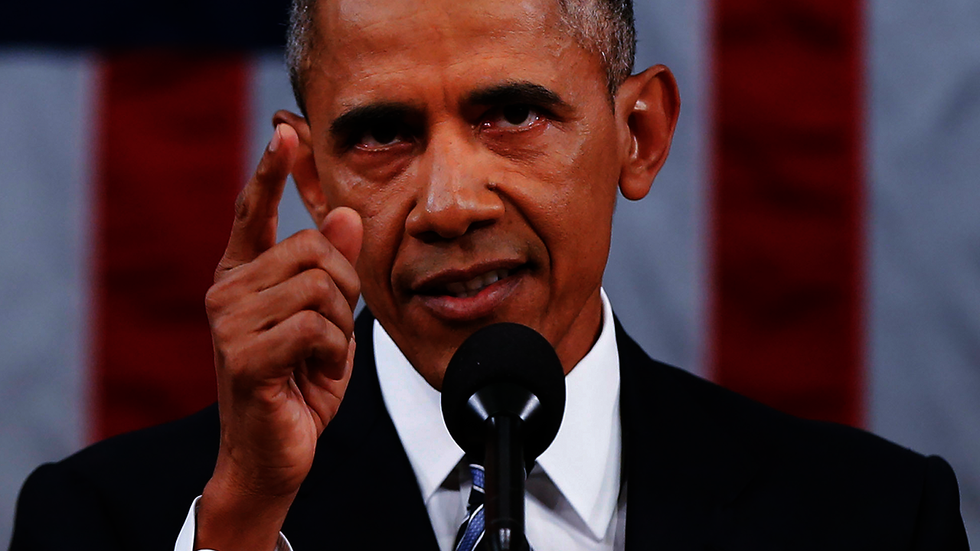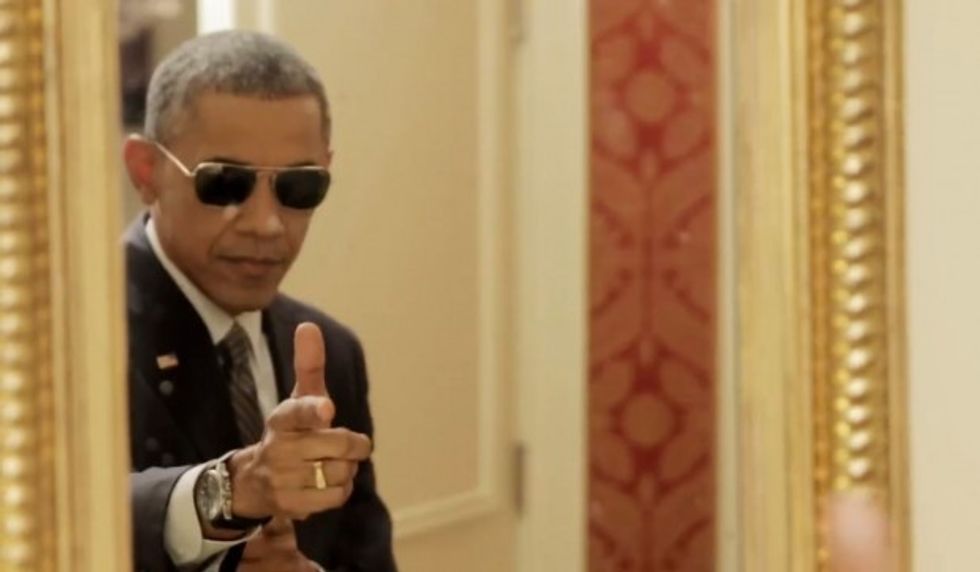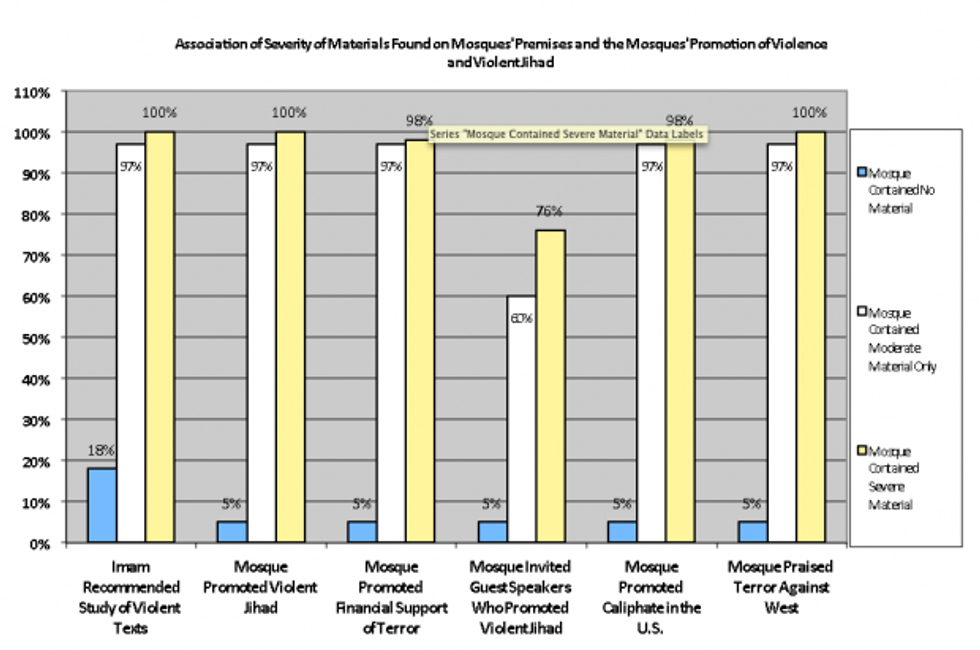
Radio talk show host Rush Limbaugh has a theory as to why former President Barack Obama didn't stop the alleged Russian hack if he knew about it. (Getty Images)

The White House's "Countering Violent Extremism" summit is barely underway, yet the message is already clear: the conference is politically correct -- and far worse -- a charade.
And that is a charitable interpretation.
Its sponsors are engaging in intentional obfuscation (e.g., saying "violent extremism" is the enemy), as well as peddling ineffective and ill-considered policy proposals (more community "empowerment"). The conference will effectively aid and abet America's increasingly ascendant jihadist foes.
Reviewing the Obama administration's summit preview, here are its 10 most disturbing aspects:

According to the White House preview [emphasis mine]:
Really at the core of our approach is that the government does not have all the answers in combatting violent extremism. It is, at its core, a bottom-up approach. It puts communities with civic leaders, with religious authorities, with community power brokers, teachers, health providers, et cetera, in the driver’s seat. They know their citizens best. They are the first line of defense to prevent or counter radicalizing forces that can ultimately lead to violence. And so our approach is to really embrace and empower what local communities can do. So we've been working with our federal partners and our local partners to put in place this approach over the past couple of years.
Further:
Again, this is not about government, especially the federal government. The federal government doesn’t have all the answers. This is about building a comprehensive network to fight back against violent extremism. And we are explicitly recognizing the role that civil society plays, the private sector plays, and that families, et cetera, can play in countering violent extremism.
Who knew the Obama administration had so much respect for and faith in civil society?
Yet of course, this faith turns out to be dangerously misplaced as...
As Patrick Poole noted in an extensive report for TheBlaze:
In December 2011, the White House issued the "Strategic Implementation Plan for Empowering Local Partners to Prevent Violent Extremism in the United States" – the local partners, of course, being Islamic organizations, including those cited by the Justice Department as working to aid foreign terrorist organizations. All national security and law enforcement agencies on the federal, state and local level would now have to consult these groups and rely on "local partners" as a matter of policy. And as made clear in Salam al-Marayati’s Los Angeles Times op-ed, Islamic groups complaining about counter-terrorism policies or training would disrupt government efforts to “counter violent extremism” gave them an implicit veto over counter-terrorism policies. [Los Angels Times link added for context]
Why should we care about this 2011 report?
A senior Obama administration official noted in previewing the summit that the report details the very efforts the administration will be hawking during the three-day event.
Local partners such as the Council on American-Islam Relations -- an unindicted co-conspirator in the largest Hamas funding trial in history -- has advised members of the Muslim community not to work with the FBI, and religious leaders to lawyer up as opposed to working together with law enforcement when it comes to potential jihadists. On the eve of the summit, CAIR is reportedly calling for the Department of Justice to "protect those who act in good faith to prevent violent extremism by engaging with [Muslims] considering it in order to dissuade them."
A partner of perhaps higher standing is the Islamic Society of Boston (ISB), a group linked to numerous jihadis and jihadi-sympathizers, that is reportedly the primary liaison between the Muslim community and law enforcement in countering violent extremism. The Boston program will be one of the three held up as a success story during the summit, despite the ISB's Islamic supremacist efforts.
Looking to the heart of Muslim communities, according to the Mapping Sharia project, imams in over 80 percent of 100 randomly surveyed representative mosques in America recommended the study of violence-positive texts. The correlations with these texts are disturbing, as illustrated below:

In Pew's extensive 2011 report on Muslims in America, 21 percent of those polled indicated there was a great deal or fair amount of "support for extremism among Muslim American;" 19 percent did not indicate that "suicide bombing/other violence against civilians is justified to defend Islam from its enemies;" only 70 percent indicated that they viewed Al Qaeda "very unfavorably."
As leaked Department of Homeland Security documents reveal, the second highest concentration of people designated as "known or suspected terrorists" by our government reside in Dearborn, Michigan. Dearborn's population is 96,000, and it has the highest percentage of Arab-Americans of any city in the country.
In light of these figures, and the fact that jihadist groups worldwide claim they are at war with America, having committed over 25,000 attacks in the name of Allah since Sept. 11, 2011, one must ask, what exactly is the rationale behind leaving self-policing to Muslim communities when these are the very places from whence jihadists spring?
Such a policy of course is only baffling if you are of the belief that jihad is an Islamic tenet, and that Islamic supremacist ideology is what animates the vast majority of the world's "violent extremists."
But of course...
Returning to the transcript:
[I]n the United States there has been violent extremists that come in all sorts of shapes and sizes, and so the agenda for all three days is going to show a wide array of speakers and participants from all backgrounds who combat radicalization, violent extremism and terrorism in its many forms....In terms of the phrase “vulnerable community,” I think one is that we want to be clear that the evidence doesn’t show that there’s any particular community, there’s no profile that we can point to say this person is from this community, is going to be radicalized to violence.
Per the preview:
Q: I’m just wondering, in light of the current events that Andrea Mitchell and others mentioned during this call, almost all of those involves Muslim extremism. And I get that the phrase for this three-day event is “violent extremism.” Might some critics think that you’re avoiding the world “Muslim” as though extremists in the Islamic communities are the focus -- or are they not the focus? That’s my question.SENIOR ADMINISTRATION OFFICIAL: ...I think obviously we want to be taking into account the current concerns that different countries are facing. But as I think will be clear from the variety of presentations and case studies that are mentioned -- to include some of the media that we have organized to help catalyze the discussion that features some of the longer-running terrorist threats that people sometimes forget about in the current context, such as the FARC in Colombia, which is now in negotiations, but has been a designated terrorist organization for some time, responsible for countless acts of violence.
I think we will see through the complexity of the discussion that violent extremism is a broader trend...I think we’ll see in the context of the meeting itself the diversity that reflects the reality of recent history.

Per the administration preview:
SENIOR ADMINISTRATION OFFICIAL: Let’s be clear. We recognize that violent extremism spans many decades and has taken many forms. But we all agree that the individuals who perpetuated -- who perpetrated the terrorist attacks in Paris and elsewhere are calling themselves Muslims and their warped interpretation of Islam is what motivated them to commit these acts. They’re not making any secret of that, and neither are we.But we are very, very clear that we do not believe that they are representing Islam. There is absolutely no justification for these attacks in any religion, and that’s the view of the vast majority of Muslims who have suffered huge casualties from the likes of folks like ISIL or al Qaeda. So you can call them what you want. We’re calling them terrorists.
Per the White House preview [emphasis mine]:
The final panel will focus on secure and resilient communities, and it will, in particular, begin by looking at the role of civil society, particularly youth and women preventing violent extremism. It will look at community-police relations and community-security force relations as a critical element of prevention. And it will finally broaden that conversation to address social, economic and political marginalization, including the effects of integration of minority communities.
Based on all we have observed from this White House, do you think that the onus will fall on law enforcement to work on "improving relations" with "violent extremist" communities, or vice-versa? Reports on the Minneapolis countering violent extremism pilot program, one of the three that will be presenting at the summit, indicate that its Somali Muslim community mistrusts law enforcement because it fears being spied upon. Does this give you confidence in cooperation from a neighborhood that has produced over a dozen known jihadists in recent years?
The notion that "marginalization" and poor integration in minority communities is the root cause of jihadism, as echoed by State Department spokeswoman Marie Harf is a canard. Not only are there very wealthy families from the bin Ladens to the Saudi royals who drive jihadism worldwide, but conversely practically every group that has ever succeeded in America came to this country poor and marginalized, yet did not resort to strapping bombs to themselves or chopping off heads.
None of this is even to mention the fact that Muslims, other ethnic and religious minorities and the most important minority, the individual, has at least historically had more freedom and opportunity in America than in any other country in the world. Perhaps the White House wishes this forum to be a vehicle for revisiting Ferguson.
Clearly the recidivism rate for Guantanamo Bay detainees has not sunk in to the collective mind of the public, as the White House continues:
The third session focuses on weakening the legitimacy and the resonance of the brand of violent extremism. So that will include a panel on strategic communications, social media. It will include a discussion of how non-violent religious issues and education can be elevated as a matter of international and local-level concern. And it will look at best practices with regard to rehabilitating and reintegrating violent extremists.
Note that this is also in keeping with the Obama administration's efforts through Eric Holder's Justice Department to treat terrorism as a criminal matter.
One of the more unbelievable indications of the Obama administration's willful lack of self-awareness is that it has regularly partnered with the "violent extremists," aiders, abetters and sympathizers with whom theoretically this summit is about countering.
The administration is currently negotiating with Iran on its nuclear program -- the largest state sponsor of terror in the world.
Several weeks ago the White House met with the Muslim Brotherhood, an organization whose 1991 strategic memorandum on North America called for a "grand Jihad in eliminating and destroying the Western civilization from within and 'sabotaging' its miserable house by their hands and the hands of the believers so that it is eliminated and God's religion is made victorious over all other religions."
In Libya and Syria we have armed jihadists to our own great detriment.
How can a president who so frequently makes common cause with, and whose interventions overseas have so consistently aided jihadists, have any credibility in countering violent extremism?
Little exemplifies better how ill-equipped America is to deal with the threats facing her than the fact that the Obama administration wants us to believe that we are fighting "violent extremism."
Violent extremism is not an enemy, it's a euphemism. Terrorism is not an enemy, it's a tactic.
As many have said in recent weeks, if you cannot identify your enemy, you cannot defeat it. By not having the moral clarity, or even worse by exhibiting such cowardice in creating a mushy phrase like "violent extremism," which not only obscures the enemy from the American people, but allows the Obama administration to associate all sorts of other peoples with jihadists is shameful.
Islamic supremacists are at war with us. It is quite evident we are not at war with them.
Were the summit actually to identify Islamic supremacism as the enemy, as the Center for Security Policy's recent Defeat Jihad Summit illustrated, we might examine issues among many others including:
We should seriously consider the aforementioned 1991 Muslim Brotherhood memorandum on its mission in North America:
The process of settlement is a "Civilization-Jihadist Process" with all the word means. The Ikhwan [Brotherhood] must understand that their work in America is a kind of grand Jihad in eliminating and destroying the Western civilization from within and "sabotaging" its miserable house by their hands and the hands of the believers so that it is eliminated and God's religion is made victorious over all other religions. Without this level of understanding, we are not up to this challenge and have not prepared ourselves for Jihad yet. It is a Muslim's destiny to perform Jihad and work wherever he is and wherever he lands until the final hour comes, and there is no escape from that destiny except for those who chose to slack. But, would the slackers and the Mujahedeen be equal.…A mission as significant and as huge as the settlement mission needs magnificent and exhausting efforts. With their capabilities, human, financial and scientific resources, the Ikhwan will not be able to carry out this mission alone or away from people and he who believes that is wrong, and God knows best. As for the role of the Ikhwan, it is the initiative, pioneering, leadership, raising the banner and pushing people in that direction. They are then to work to employ, direct and unify Muslims' efforts and powers for this process. In order to do that, we must possess a mastery of the art of "coalitions", the art of "absorption" and the principles of "cooperation."
—
Follow Ben Weingarten (@bhweingarten) and TheBlazeBooks on Twitter and Facebook, and be sure to subscribe to Ben’s Blaze Books podcast -- consisting of interviews with leading conservative and libertarian thinkers -- which you can find on iTunes, Soundcloud, and Stitcher.
—
TheBlaze contributor channel supports an open discourse on a range of views. The opinions expressed in this channel are solely those of each individual author.
Ben Weingarten